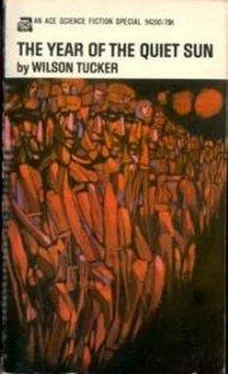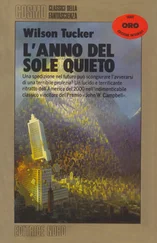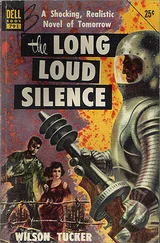Wilson Tucker - The Year of the Quiet Sun
Здесь есть возможность читать онлайн «Wilson Tucker - The Year of the Quiet Sun» весь текст электронной книги совершенно бесплатно (целиком полную версию без сокращений). В некоторых случаях можно слушать аудио, скачать через торрент в формате fb2 и присутствует краткое содержание. Год выпуска: 1970, ISBN: 1970, Издательство: Ace Books, Жанр: Фантастика и фэнтези, на английском языке. Описание произведения, (предисловие) а так же отзывы посетителей доступны на портале библиотеки ЛибКат.
- Название:The Year of the Quiet Sun
- Автор:
- Издательство:Ace Books
- Жанр:
- Год:1970
- ISBN:0-441-94201-6
- Рейтинг книги:3 / 5. Голосов: 1
-
Избранное:Добавить в избранное
- Отзывы:
-
Ваша оценка:
- 60
- 1
- 2
- 3
- 4
- 5
The Year of the Quiet Sun: краткое содержание, описание и аннотация
Предлагаем к чтению аннотацию, описание, краткое содержание или предисловие (зависит от того, что написал сам автор книги «The Year of the Quiet Sun»). Если вы не нашли необходимую информацию о книге — напишите в комментариях, мы постараемся отыскать её.
Won retrospective John W. Campbell Memorial Award in 1976.
Nominated for Nebula Award for Best Novel in 1970.
Nominated for Hugo Award for Best Novel in 1971.
The Year of the Quiet Sun — читать онлайн бесплатно полную книгу (весь текст) целиком
Ниже представлен текст книги, разбитый по страницам. Система сохранения места последней прочитанной страницы, позволяет с удобством читать онлайн бесплатно книгу «The Year of the Quiet Sun», без необходимости каждый раз заново искать на чём Вы остановились. Поставьте закладку, и сможете в любой момент перейти на страницу, на которой закончили чтение.
Интервал:
Закладка:
The elapsed time was one minute, forty-four seconds. Someone after William had done that. Someone else had opened the shelter, pilfered the stores, donned winter clothing, and listened to the taped report. Someone else had let the machine run on another minute and forty-four seconds before shutting it off and taking his leave. The visitor may have returned, but William never did.
Arthur Saltus felt that fair warning. He closed the corridor door and thumbed a manual switch to keep the shelter lights on. An Army-issue automatic was taken from the stores and strapped around his waist.
Another mouth-filling pull from the bottle, and he rolled the tape back to his “Mark.”
“Saltus checking in. That was my mark and this is my birthday, 23 November, in the nice round number year of 2000. I am fifty years old but I don’t look a day over twenty-five — chalk it up to clean living. Hello, Katrina. Hello, Chaney. And hello to you, Mr. Gilbert Seabrooke. Is that nosey little man from Washington still knocking around back there?
“I arrived at 10:55 or 11:02 something, depending on which timepiece you read. I say something because I don’t yet know if it’s a dilemma or the other — I haven’t put my nose outside to test the wind. I have lost all faith in engineers and mercury protons, but they’d better not cheat me out of my full birthday. When I walk out that door I want to see bright sunshine on the greensward — morning sunshine. I want birds singing and rabbits rabbiting and all that jazz.
“Katrina, the housekeeping is awfully sloppy around here: it’s poor ship. Dust on the furniture, the floors, lights burned out, empty boxes littering the place — it’s a mess. Strangers have been wandering in and out, helping themselves to the drygoods and pinching the groceries. I guess somebody found a key to the place.
“Everything you heard before my mark was William’s report. He didn’t come back to finish it, and he didn’t go up to Chicago or anywhere near there — you can rely on that.” The bantering tone was dropped. “He’s outside.”
Arthur Saltus began a straightforward recital of all that he’d found. He ticked off the missing items from the stores, the number of empty boxes stacked haphazardly along the wall, the used water cans, the two lanterns which had seen but little service — William may have tested the one found on the bench — the debris on the floor, the insignia, and the peculiarity of the tape being rolled forward. He invited his listeners to make the same timedelay test he’d made and then offer a better explanation if they didn’t care for his.
He said: “And when you come up here, civilian, just double-check the stores; count the empties again to see if our visitor has been back. And hey — arm yourself, mister. You’d damned well better shoot straight if you have to shoot at all. Remember something we taught you.”
Saltus flicked off the machine to prevent the tape from listening to him take a drink — as difficult as that might be — and then flicked it on again.
“I’m going topside to search for William — I’m going to try tailing him. Lord only knows what I’ll find after sixteen months but I’m going to try. It’s likely he did one of two things: either he’d go for Joliet to find out what he could about that Chicago thing, or he’d jump into the squabble if it was alongside.
“If the squabble was here — on the station — I think he’d run for the northwest corner to help the Corporal; he’d have to get into the fight.” Short pause. “I’m going up to take a look at that corner, but if I don’t find anything I’ll run into Joliet. I’m in the same boat now with old William — I’ve got to know what happened to Chicago.” He stared solemnly at the. empty space in his bottle and added: “Katrina, this sure knocks hell out of your survey. All that studying for nothing.”
Saltus stopped talking but let the machine run on.
He plugged in a radio and connected the leads to the outside antenna. After a period of band searching, he reported back to the tape recorder.
“Radio negative. Nothing at all on the GI channels.” Another slow sweep of the bands. “That’s damned funny, isn’t it? Nobody’s playing the top ten platters.”
Saltus switched over to the civilian wavelengths and monitored them carefully. “The forty- and eighty-meter bands are likewise negative. Everybody is keeping their mouths shut. What do you suppose they’re scared of?” He went back to a military channel and turned up the gain to peak, hearing nothing but an airy whisper. The lack of communications nettled him.
The send button was depressed.
“Navy boot, come in. Come in, boot, you know me — I caddied for the Admiral at Shoreacres. Saltus calling Navy boot. Over.”
He reported himself two or three times on several channels.
The radio crackled a sudden command. “Get off the air, you idiot! They’ll get a fix on you!” It went silent.
Saltus was so startled he turned off the radio.
To the tape recorder: “Chaney, did you hear that? There is somebody out there! They don’t have much going for them — the power was weak, or they were a long ways off — but there is somebody out there. Scared spitless, too. The ramjets must have them on the run.” He stopped to consider that. “Katrina, try to find out what a ramjet is. Our Chinese friends can’t be here; they don’t have the transport, and they couldn’t get through the Pacific minefields if they did. And keep that under your hat, civilian — it’s top secret stuff.”
Arthur Saltus equipped himself for the target, always remembering to keep an eye on the door.
He helped himself to a parka and pulled the hood over his head; he removed the light shoes he’d been wearing the summer he left and found a pair of hiking boots the proper size. Mittens were tucked into a pocket. Saltus slung a canteen of water over one shoulder and a pack of rations on his back. He picked out a rifle, loaded it, and emptied two boxes of cartridges into his pockets. The map was of little interest — he knew the road to Joliet, he’d been there only last Thursday to look into a little matter for the President. The President had thanked him. He loaded a camera and found room to pack away a fresh supply of nylon film.
Saltus decided against taking a radio or recorder, not wanting to be further encumbered; it would be awkward enough as it was and all signs clearly indicated the survey was sunk without a trace. Chicago was lost, forbidden, and Joliet might be a problem. But there was something he could do with the recorder and William’s brief message — something to insure its return to home base. A last searching examination of the room gave him no other thing he thought he would need. The lights were turned off.
Saltus took a long pull on his dwindling supply of bourbon and quit the shelter. The corridor was dusty and vacant, and he fancied he could see his own footprints.
He carried the tape recorder with its dangling cord back to the operations room where the vehicle waited in its polywater tank. A thorough search of the room failed to reveal an electric outlet; even the service for the clock and the calendar came through the wall behind the encased instruments, wholly concealed.
“Damn it!” Saltus spun around to stare up at the two glass eyes. “Why can’t you guys do something right? Even your lousy proton gyroscope is — is sheeg!”
He strode out of the room, marched along the dusty corridor to the adjoining laboratory door, and gave it a resounding kick to advertise his annoyance. That ought to shake up the engineers.
His jaw dropped when the door swung open under the blow. Nobody slammed it shut again. Saltus edged closer and peered inside. Nobody shoved him back. The lab was empty. He walked in and stared around: it was his first sight of the working side of the project and the impression was a poor one.
Читать дальшеИнтервал:
Закладка:
Похожие книги на «The Year of the Quiet Sun»
Представляем Вашему вниманию похожие книги на «The Year of the Quiet Sun» списком для выбора. Мы отобрали схожую по названию и смыслу литературу в надежде предоставить читателям больше вариантов отыскать новые, интересные, ещё непрочитанные произведения.
Обсуждение, отзывы о книге «The Year of the Quiet Sun» и просто собственные мнения читателей. Оставьте ваши комментарии, напишите, что Вы думаете о произведении, его смысле или главных героях. Укажите что конкретно понравилось, а что нет, и почему Вы так считаете.












